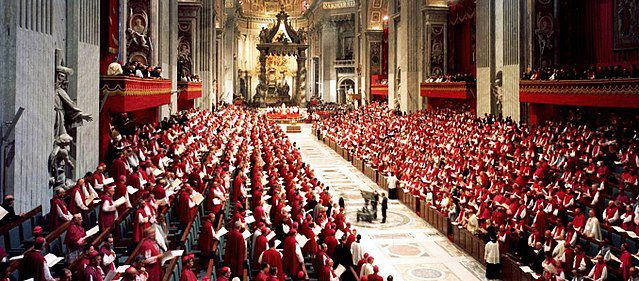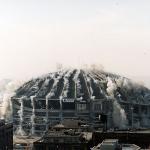
This was a spontaneous exchange on my Facebook page. Words of the participants (besides myself) are color-coded. Thanks to Deacon David Oatney in particular for his very helpful contributions.
*****
Joshua Herbert [U.S. church membership has ] been in decline since Vatican II, go figure.
There was also this thing called “the 60s” and the sexual revolution . . . But people prefer to blame an orthodox ecumenical council. Go figure. Are you claiming that VCII is heterodox or not? [Joshua never answered] I don’t want to hear the “ambiguous” crap and the “pastoral council” and all the rest of the talking points. I’ve lost all patience with that nonsense.
There was the Protestant Reformation, however Our Lady of Gaudalupe [sic] made up for it. Where is the gain in converts since Vatican II?
As for converts, there has been a tremendous influx for 30 years. The apologetics movement is dominated by them. In my case, I came in as a Newman devotee, and particularly influenced by VCII (Newman was considered the father of it). If I had been fed reactionary talking points I would never have converted in 100 years. I was quite happy as an evangelical.
Mike Ruggieri V2 is a completely legit council. Not every rite of the church worshipped in Latin or the Tridentine mass, and if memory serves the Ambrosian rite always worshiped in the vernacular despite being a western rite. Not to mention all the eastern particular churches in union with Rome of which one I belong to (Byzantine/Italo-Greek.). Cultural mores are to blame, as is rising secularism and the blandishments of hedonism doesn’t help either. Bottom line, if Vatican 2 is anything, it’s a scapegoat, that when cited calls away attention from real societal issues.
Deacon David Oatney When the Ambrosian Rite was established the vernacular would have been Latin. Remember, it is the rite of Milan.
Whatever one might think of what has happened in the church since the second Vatican council, the legitimacy of the council cannot be questioned. It was absolutely legitimate, and it’s dogmatic constitutions must be embraced by all the faithful.
I have to confess that one of the things that I have wondered is whether or not what is happening here is that the nominal Catholics are finally taking a hike…
And not just the Catholics, but other nominal people in other ecclesial communities…
Mind you, I’m not saying that we do not want the Church to grow or that decline is a good thing. No, what I am saying is that perhaps it was never as “good” as what some people make it out to be, and the numbers are beginning to reflect what has been there all along. A lot of people going to church for show, but not living the life, nor caring to do so.
Rosemarie Scott Sub-Saharan Africa has seen a substantial number of converts to Catholicism since the Second Vatican Council.
Isn’t there something lost in the Latin? Has not the reverance [sic] and beauty been changed? Has the sacrament been abused more? Is the Mass more anthropocentric than God-centric? The smoke of Satan entering the Church? What could that mean? To blame the Mass Exodus of Catholics from the faith on the sexual revolution seems too simplistic. Can anyone just dismiss the eradication of the Church’s teachings on social movements outside the Church? Have we ever had such a loss in faith after an ecumenical council in the Church’s history?
None of that proves in the least that it was the fault of the council. You think like a Protestant or a Catholic liberal. The faithful Catholic accepts the sublime authority of ecumenical councils, guided by the Holy Spirit under the headship of popes.
Yes, in fact, there were generally upheavals before, after, or during every ecumenical council.
I think like a Protestant or a Catholic liberal? Wow.
That’s right. Neither accepts the authority of ecumenical councils (or popes), and you are playing that game, yet you can’t see that you are. So I have to point it out to you: as a longtime observer of the tragic shortcomings of reactionary thinking. I was a Protestant. I know how they think. And I know how Catholic liberals think, by virtue of having debated them many times, or having read about them in Newman, Chesterton et al.
If we’re going to criticize the Novus Ordo, we may as well follow that logic all the way back and call the Tridentine mass illicit as well, since the norm before Latin was Aramaic and Greek. That logic simply doesn’t work. And while we’re at it, let’s also argue leavened vs unleavened bread as well.
I think it can be legitimately argued, as the late Monsignor Klaus Gamber (St. Paul VI’s private Chamberlain) did, that liturgical changes which took place in the years following the second Vatican council went well beyond what the council fathers had intended. Many people, especially liturgists, took liberties that the council never intended to be taken.
However, as Monsignor Gamber also said, the use of the vernacular is not at issue, and that should not be seen as a problem.
Liturgical abuses: absolutely. Fault of the council: no. And VCII said the Latin should be retained (too). It wasn’t in most places, but obviously that is counter to the wishes of the council, too.
Yet it seems to get blamed for everything because people can’t figure out causation of complex issues and would rather sink to conspiratorialism.
I have found that on all sides that the documents of the Second Vatican Council are the most quoted and least read documents in Church history.
***
Savio Victor Gomes Why was VCII even convened? Every council in the past was convened to address some issue or heresy that endangered the faith of the community. Why was the external “fresh air” even required? Weren’t Catholics worldwide already at home with the “air” within? What was the heresy/doctrinal issue that VCII tried to address? Was there any complaint from any of the Christian parishes worldwide that people are bored of Latin and they feel disconnected during mass because of the language chasm? Or was there any group of faithful in any country who vehemently disagreed with “extra ecclesiam nulla salus” that VCII had to go lenient on this?
The Church had developed a “fortress mentality”; and issues that had developed over the previous 400 years had to be addressed. Modernism had already made tragic inroads into the Church.
My mentor, Servant of God Fr. John A. Hardon, SJ (as orthodox as they come) said that the “revolution” of modernism in the Church began around 1940.
Mass in the vernacular was already widely taking place. VCII stated that the Latin should be retained. Many parishes ignored that. Blame them, not the council.
VCII did not change “no salvation outside the Church” in the least. It was Trent (following Augustine contra the Donatists 1100 years earlier) that declared that non-Catholic trinitarian baptism was a valid sacrament, and that those who received it were truly Christians and members of the Body of Christ.
What other issues — Is it only Modernism that you mean by issues? How did VCII address Modernism? Which VCII document clearly lays out steps to combat Modernism? I agree with the mass in vernacular point that you mentioned though.. However I am yet to do more research on salvation of non-Christians and what the Church taught before and after VCII regarding this. Thanks to people like you who help me in my learning and study and inspire me to explore further. I am currently studying about VCII and so asking these questions.
See: “Seven Factors That Gave Rise to Vatican II” by Bill Huebsch.
For many articles (including my own) on “no salvation outside the Church” see my Ecumenism and Christian unity web page.
Thanks brother Dave.. I will check all these links that you posted.. I read your apologia on the Paul VI mass [link] with an open mind and it clarified most of the arguments that I kept hearing in Trad circles.
Excellent. Glad to be of service to you.
***
Photo credit: Cardinals gathered at the Second Vatican Council (1962-1965); Dave582 (uploaded on 5-16-18) [Wikimedia Commons / Creative Commons Attribution-Share Alike 4.0 International license]
***













